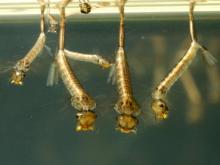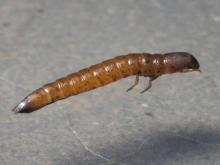Aquatic Invertebrates
Media

Species Types
Scientific Name
About 125 species in North America in the family Corixidae
Description
Water boatmen are one of the few aquatic true bugs that are not predatory and do not bite people. Instead, they suck juices from algae and detritus. Only a few types eat other small aquatic creatures.
Media

Species Types
Scientific Name
There are about 50 species of mosquitoes in our state.
Description
The larvae of mosquitoes, often called “wrigglers,” have a large head and thorax and a narrow, wormlike abdomen; they typically hang just below the water surface. When disturbed, they wriggle downward.
Media

Species Types
Scientific Name
Podura aquatica
Description
In early spring, clusters of water springtails float on the surface of quiet waters, on muddy banks, and on protruding objects. Adults are bluish gray with reddish appendages.
Media

Species Types
Scientific Name
About 100 species in North America north of Mexico
Description
Riffle beetles live underwater, in shallow, swift-flowing streams, as both adults and larvae. The adults, the size of small ants, are oval with long legs. The larvae are elongated, multi-segmented, and rather hard and stiff; they reach about ½ inch long.
Media

Species Types
Scientific Name
About 100 species in North America north of Mexico
Description
Riffle beetles live underwater, in shallow, swift-flowing streams, as both adults and larvae. The larvae are elongated, multi-segmented, and rather hard and stiff; they reach about ½ inch long. The adults, the size of small ants, are oval with long legs.
See Also
About Aquatic Invertebrates in Missouri
Missouri's streams, lakes, and other aquatic habitats hold thousands of kinds of invertebrates — worms, freshwater mussels, snails, crayfish, insects, and other animals without backbones. These creatures are vital links in the aquatic food chain, and their presence and numbers tell us a lot about water quality.





















